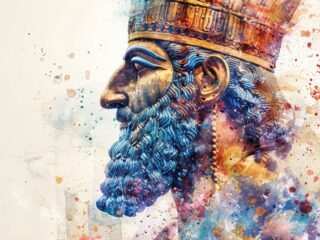Looking over the development of Scripture, we see that from Genesis 4 until the middle of Exodus, the theme of God’s people in God’s place recedes to the background. Why? Because before Moses gets to tell that story, he has to tell us how God’s people Israel came to be a nation in the first place. In the story of Israel, we see the great lengths God went to in order to draw his people back to himself.
That’s Genesis. It charts a path from Adam to Seth to Noah to Abraham to Isaac to Jacob to Jacob’s twelve sons. Jacob also goes by the name Israel, so the account of Jacob and his twelve sons is also the story of Israel and its twelve tribes.
Throughout Genesis, the Lord makes all sorts of promises about these people who will come from Abraham’s line. To Abraham he says,
- They will become a great nation (12:2).
- That nation will eventually become a conduit through which God will bless the whole world (12:3).
- Some of Abraham’s offspring will be kings (17:6).
- This promise or covenant God is making is “everlasting.” God promises Abraham that he will “be God to you and to your offspring after you” (17:7).
The Lord repeats versions of these same promises to Isaac and Jacob. We can summarize these promises as blessing, seed, and land. He will bless his people—as well as the outsiders who bless his people. He will plant seeds, establishing a lineage and an inheritance for his people. And eventually he will give them a land that is entirely their own.
God Didn’t Leave Us on Our Own
Clearly, after exiling Adam and Eve out of Eden, the Lord didn’t leave humanity to fend for themselves. He didn’t consign us to a hopeless fate. He continued interacting with his creation, mercifully beckoning them to trust him.
As we read Genesis it’s clear that if we want to be with the Lord, if we want to receive his blessing, then we should trust the promises he made to Abraham. We should trust his character: that he is good, he means what he says, he has compassion on our suffering, and he moves heaven and earth to draw us back to himself.
This might all sound really foreign and distant and abstract. Who’s this guy telling me to “trust the promises he made to Abraham”? What does that even mean? I’m sympathetic to that instinct. But if that’s what you’re thinking, just remember that God’s promises both to ancient believers and to us all prompt the same set of questions: Is the Lord trustworthy? Is following him worth it, despite the temptations to chart an easier path? What can I glean from the story of redemptive history that will give me hope in my struggles today?
As you continue to read, keep an eye out for something important: God’s faithfulness. Neither the good nor the bad circumstances will stop God from working on behalf of his people, from mending the broken things, or from pointing his children toward home: a place where all wrongs are made right, exile is lifted, and God dwells in unbroken fellowship with humankind once again (and forever). No matter what his people do, God does not give up on them and does not let their sin have the final say.
God’s Plan in Action
By the time Genesis ends, the stage is set for the first phase of God’s grand redemption that will come in Exodus. Of course, none of the principal characters have any idea that this is going to happen. They can’t tell the future, so they don’t fully understand the present. Joseph and his brothers have no idea they’re living through the golden era of Israel’s relationship with Egypt. After all, Joseph is second in command! The Israelites have their own area in Egypt (Goshen) where they are free to live however they please.
If you didn’t know where the story went next, then you might get to the end of Genesis 50 and think to yourself, Wait a second, have the promises the Lord made to Abraham already come true!? They’ve got land on loan from Pharaoh, they’re able to be fruitful and multiply, and the promised blessing seems to have been mediated from Abraham’s family to the whole world.
Aren’t God’s people finally in God’s place? Well, they’re where they are supposed to be for a season. But it’s not their forever place. The land’s on loan from Egypt. They’re renting a room. Joseph knows this. He knows the fulfillment of God’s promises requires more than the peace they’re currently experiencing.
All we need to do is look at his final words for proof:
And Joseph said to his brothers, “I am about to die, but God will visit you and bring you up out of this land to the land that he swore to Abraham, to Isaac, and to Jacob.” Then Joseph made the sons of Israel swear, saying, “God will surely visit you, and you shall carry up my bones from here.”
Genesis 50:24–25
Looking Ahead to a Future Home
Somewhere along the way, God spoiled the plot for Joseph. He told him about the upcoming exodus. That’s why Joseph wants his brothers to swear to take his bones with him when they leave their temporary home and go to their promised home. But when will this happen? It’s not immediately clear.
If you look at the opening verses of Exodus, it appears the descendants of Israel are picking up the mantle of Adam and Eve: They’re being fruitful and multiplying. They’ve become exceedingly strong. They’re filling the land. These Israelite image-bearers seem to be fulfilling their special job.
But then a new Pharaoh rises to power in Egypt—one who views the young Israelite nation as a threat. So he and the Egyptians “ruthlessly made the people of Israel work as slaves and made their lives bitter with hard service, in mortar and brick, and in all kinds of work in the field” (Exodus 1:13–14).
God gave Joseph the trajectory of Israel’s redemption, but I wonder if he gave him the time- line?1 From Exodus 1:1 to Exodus 1:14, Moses summarizes about four hundred years. The centuries have not been kind to Jacob’s descendants; they’ve moved from welcome guests to unwelcome threats.
Their multiplication has enticed the Egyptians to murder; their fruitfulness has pushed Pharaoh to infanticide (Exodus 1:15–22). Where is God in all this? Has he left his people for dead?
No, he’s preserving the life of their future liberator (2:1–22). He’s not forgotten them even for a moment. I love how Moses pulls the camera’s focus back and offers this delightful assessment during such a dark time:
During those many days the king of Egypt died, and the people of Israel groaned because of their slavery and cried out for help. Their cry for rescue from slavery came up to God. And God heard their groaning, and God remembered his covenant with Abraham, with Isaac, and with Jacob. God saw the people of Israel—and God knew.
Exodus 2:23–25
Did you notice how Moses reassures his audience that God’s people still have his attention? No matter their circumstances, he hears them and he sees them. And now he’s about to act on their behalf.
Redeeming a People for Himself
Okay, now I’m pressing fast-forward. Let your mind’s eye picture a sped-up Moses and Aaron as God uses them to unleash ten plagues on Egypt—from gnats to frogs to blood to boils to destructive hail to pitch-black darkness to Pharaoh’s scream over the death of his and his countrymen’s beloved sons. God orchestrated a display of his uncontested might and glory as he rescued his people from slavery.
Why did all this happen? The answer is multi-faceted: God was judging the hardness of Pharaoh’s heart. God was keeping his promises. God was extolling himself as Yahweh, the one true God. But the reason most commonly shared in the text is that all of this happened for God’s people, so that they might leave Egypt and serve the Lord. Notice how the Lord summarizes his motives:
- “Let my son go that he may serve me” (Exodus 4:23).
- “You shall say to [Pharaoh], ‘The Lord, the God of the Hebrews, sent me to you, saying, “Let my people go, that they may serve me in the wilderness”’” (7:16).
- “Let my people go, that they may serve me” (8:1).
That third refrain gets repeated throughout the ten plagues (Exodus 8:20; 9:1, 13; 10:3). After Pharaoh’s son died, after hemming and hawing and pump-faking obedience, Pharaoh finally gives in. He tells Moses and Aaron, “Up, go out from among my people, both you and the people of Israel; and go, serve the Lord, as you have said” (12:31). All of this happened so that the people of God could be plucked out of misery and replanted somewhere else. All of this happened so that they might serve the Lord.
After celebrating the Passover, the holiday in which Israel commemorated God “passing over” their homes during the final plague, Israel finally escapes the clutches of their centuries-long captors. And Moses makes sure to mention that he “took the bones of Joseph with him, for Joseph had made the sons of Israel solemnly swear, saying, “God will surely visit you, and you shall carry up my bones with you from here” (Exodus 13:19). As they were leaving Egypt, Israel remembered Joseph’s long-ago last request.
Moses keeps going:
And they moved on from Succoth and encamped at Etham, on the edge of the wilderness. And the Lord went before them by day in a pillar of cloud to lead them along the way, and by night in a pillar of fire to give them light, that they might travel by day and by night. The pillar of cloud by day and the pillar of fire by night did not depart from before the people.
Exodus 13:20–22
Remember, the goal of this book is to track the movement of God’s people back toward their home—back to being God’s people in God’s place. In the beginning, the people of God were blessed to stand in the presence of God. Then we sinned and were banished from his presence. But God didn’t give up on us. He didn’t start over. Instead, he made a bunch of promises about how he would one day make a great nation from the offspring of a washed-up old man and his worn-out wife. The people who trusted these incredible promises experienced his presence—no, not precisely how Adam and Eve did in Eden, but they experienced his good- ness nonetheless and were changed by it—drawn to want more.
By the end of Exodus 13, God’s people are on the move again. Many decades would pass before they reached the land of promise that God had sworn to Abraham, Isaac, and Jacob. But God had graciously and mightily worked to redeem a people for himself, and he would faithfully keep every promise he made to an unfaithful people.
Aren’t you glad that today God is still in the business of graciously and mightily redeeming a people for himself? Aren’t you glad he still faithfully keeps every promise he has made to unfaithful people? Like ancient Israel, our sin and need for deliverance is great. But God’s mercy, grace, and steadfast love are far greater. It was true thousands of years ago for the nomadic Israelites, and it’s true for his people today.
Excerpted from Nomad: A Short Story of Our Long Journey Home © 2025 by Alex Duke. Used with permission of New Growth Press. May not be reproduced without prior written permission.
Nomad: A Short Story of Our Long Journey Home
Did you ever feel a little bit out of place—like you don’t quite belong? Most of us have, and for good reason. The world we live in is not our true home. Just like our fellow travelers throughout the Bible, we are wandering, trying to find our way home. Once we find Jesus and let him be our guide, we can find the proper path for our long journey home. Through Nomad, you will discover how your individual story has fit into God’s big story all along.






